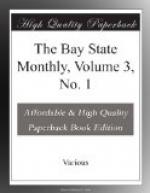Daniel Webster again said of it, “I look on the message of December, 1823, as forming a bright page in our history. I will neither help to erase it nor tear it out; nor shall it be by any act of mine blurred or blotted. It did honor to the sagacity of the government, and I will not diminish that honor. It elevated the hopes and gratified the patriotism of the people over these hopes. I will not bring a mildew, nor will I put that gratified patriotism to shame.”
The effect of this declaration in Europe was all that could have been desired by the patriotic statesmen who contributed their counsel to its adoption. The message arrived in England on December 24, 1823—twenty-two days after Mr. Monroe delivered it to Congress. On the second of January. Mr. Camming, the British Minister of foreign affairs, told the American Minister that the principles declared in the message, that the American continents were not to be considered as subject to future colonization by any of the powers of Europe, greatly embarassed the instructions he was about to send to the British Ambassador at St. Petersburg, touching the Northwestern boundary; and that he believed Great Britain would combat this declaration of the President with animation.
Its effect upon the then pending negotiations with Russia was so favorable, that the convention of 1824 was concluded in the Spring of that year, by the withdrawal on the part of the Emperor of his pretentious to exclusive trade on the Northwest coast, and by fixing the parallel of 54” 40’ as the line between the permissible establishments of the respective countries.
This in brief is the history of the celebrated “Monroe Doctrine.” It has never been affirmatively adopted by Congress, by any recorded vote, as the fixed and unalterable policy of this Republic; but its patriotic sentiment is so deeply bedded in the hearts of the American people of every political opinion, that Congress ought not and dare not ignore it.
But did not the United States Senate, when it ratified the Clayton-Bulwer Treaty in 1850, practically ignore the “Monroe Doctrine” and open the door for future trouble? Let us examine this treaty, which, in the light of present Congressional action, has become an important element in American politics, and see if it is not antagonistic to the American policy, and more than the bete noir of partizan dreams. In order for a complete understanding of the terms, and bearing of this treaty, I deem it important to give a full synopsis, rather than a brief reference to its salient points:
THE CLAYTON-BULWER TREATY.
“A convention between the United States of America and her Britannic Majesty.




